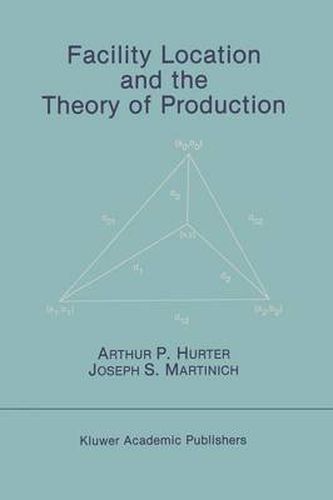Readings Newsletter
Become a Readings Member to make your shopping experience even easier.
Sign in or sign up for free!
You’re not far away from qualifying for FREE standard shipping within Australia
You’ve qualified for FREE standard shipping within Australia
The cart is loading…






This title is printed to order. This book may have been self-published. If so, we cannot guarantee the quality of the content. In the main most books will have gone through the editing process however some may not. We therefore suggest that you be aware of this before ordering this book. If in doubt check either the author or publisher’s details as we are unable to accept any returns unless they are faulty. Please contact us if you have any questions.
The design and location of production facilities are important aspects of corporate strategy which can have a significant impact on the socio economy of nations and regions. Here, these decisions are recognized as being interrelated; that is, the optimal plant design (input mix and output level) depends on the location of the plant, and the optimal location of the plant depends on the design of the plant. Until the late 1950s, however, the questions of where a firm should locate its plant and what should be its planned input mix and output level were treated, for the most part, as separate questions, and were investigated by different groups of research ers. Although there was some recognition that these questions are inter I 1928; Hoover 1948; Isard 1956], no detailed analysis related [e. g. , Pre doh or formal structure was developed combining these two problems until the work of Moses [1958]. In recent years scholarly interest in the integrated production/locaton decision has been increasing rapidly. At the same time that research on the integrated production/location problem was expanding, significant related work was occurring in the fields of operations research, transportation science, industrial engineering, eco nomics, and geography. Unfortunately, the regional scientists working on the production/location problem had little contact with researchers in other fields. They generally publish in different journals and attend dif ferent professional meetings. Consequently, little of the recent work in these fields has made its way into the production/location research and vice versa.
$9.00 standard shipping within Australia
FREE standard shipping within Australia for orders over $100.00
Express & International shipping calculated at checkout
This title is printed to order. This book may have been self-published. If so, we cannot guarantee the quality of the content. In the main most books will have gone through the editing process however some may not. We therefore suggest that you be aware of this before ordering this book. If in doubt check either the author or publisher’s details as we are unable to accept any returns unless they are faulty. Please contact us if you have any questions.
The design and location of production facilities are important aspects of corporate strategy which can have a significant impact on the socio economy of nations and regions. Here, these decisions are recognized as being interrelated; that is, the optimal plant design (input mix and output level) depends on the location of the plant, and the optimal location of the plant depends on the design of the plant. Until the late 1950s, however, the questions of where a firm should locate its plant and what should be its planned input mix and output level were treated, for the most part, as separate questions, and were investigated by different groups of research ers. Although there was some recognition that these questions are inter I 1928; Hoover 1948; Isard 1956], no detailed analysis related [e. g. , Pre doh or formal structure was developed combining these two problems until the work of Moses [1958]. In recent years scholarly interest in the integrated production/locaton decision has been increasing rapidly. At the same time that research on the integrated production/location problem was expanding, significant related work was occurring in the fields of operations research, transportation science, industrial engineering, eco nomics, and geography. Unfortunately, the regional scientists working on the production/location problem had little contact with researchers in other fields. They generally publish in different journals and attend dif ferent professional meetings. Consequently, little of the recent work in these fields has made its way into the production/location research and vice versa.